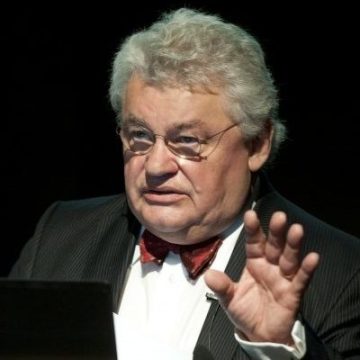Curriculum Vitae
András Szöllősi-Nagy, Hungary, has a civil engineering MSc and a PhD in hydrology fro TU Budapest. He received the Doctor of Science (D.Sc.) degree from the Hungarian Academy of Sciences in hydrology and water resources control systems. Worked at the Hungarian VITUKI, IBM Italy, IIASA and was visiting professor at the University of Lulea, Sweden, the Asian Institute of Technology, Thailand, the Waterloo University in Canada and the Beijing Normal University, China. He was the Secretary of UNESCO’s International Hydrological Programme for twenty years, served as Deputy Assistant Director General for the Natural Sciences sector and lately as Rector of the UNESCO-IHE Institute of Water Education in Delft. He was Professor of Stochastic Hydrology at TU Delft and at UNESCO-IHE. Doctor and Professor HC at several universities. His main field is stochastic hydrological systems and recursive forecasting that he continues teaching. Also involved in sustainability studies and climate change adaptation research. Currently was elected Governor of the World Water Council.
Research program
The Millennium Development Goals (MDGs) have galvanized unprecedented efforts to meet the needs of the world’s poorest, yet in several areas the objectives were clearly not achieved. The Sustainable Development Goals (SDGs) with a time frame of fifteen years were recently adopted by the UN as a trully global initiative built upon the continuation of the MDGs. With the political will declared to make the planetary systems sustainable there still are a number of methodological issues at different scales from global to local. These include up/down-scaling of analyses, data based meaningful statistical measures to monitor progress of implementation, developing forecasting capabilities to help political and policy decision making and handling cross-overs amongst the goals that require transdisciplinary research cooperation in an international setting that i-ASK is poised to provide. The Sustainability Science program aims at providing improved linkages between social sciences, engineering and natural sciences in order to close the gap between policy making and science with a view towards identifying trends for sustainable development strategies at different spatial and temporal scales by considering a nested approach. The principal objective of the program is to assist the regional, national and local decision making processes in achieving the SDGs by providing data and evidence based advice using the recent new tools, such as Big Data, agent based modeling, complexity and large networks, large distributed data bases and systems in environmental monitoring.
iASK-question
How to incorporate the cultural components, hitherto a missing link in SD considerations, into the overarching framework that underpins economic, social and environmental considerations at different spatial/temporal scales?

